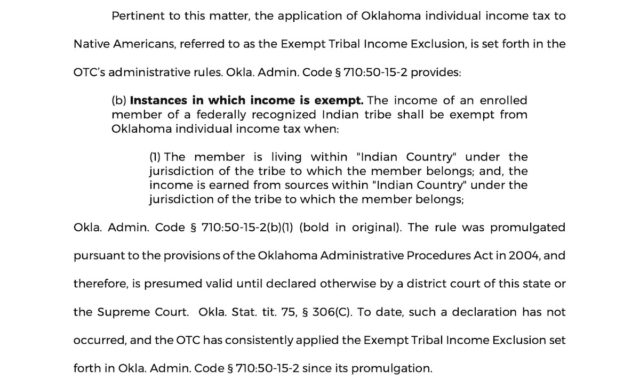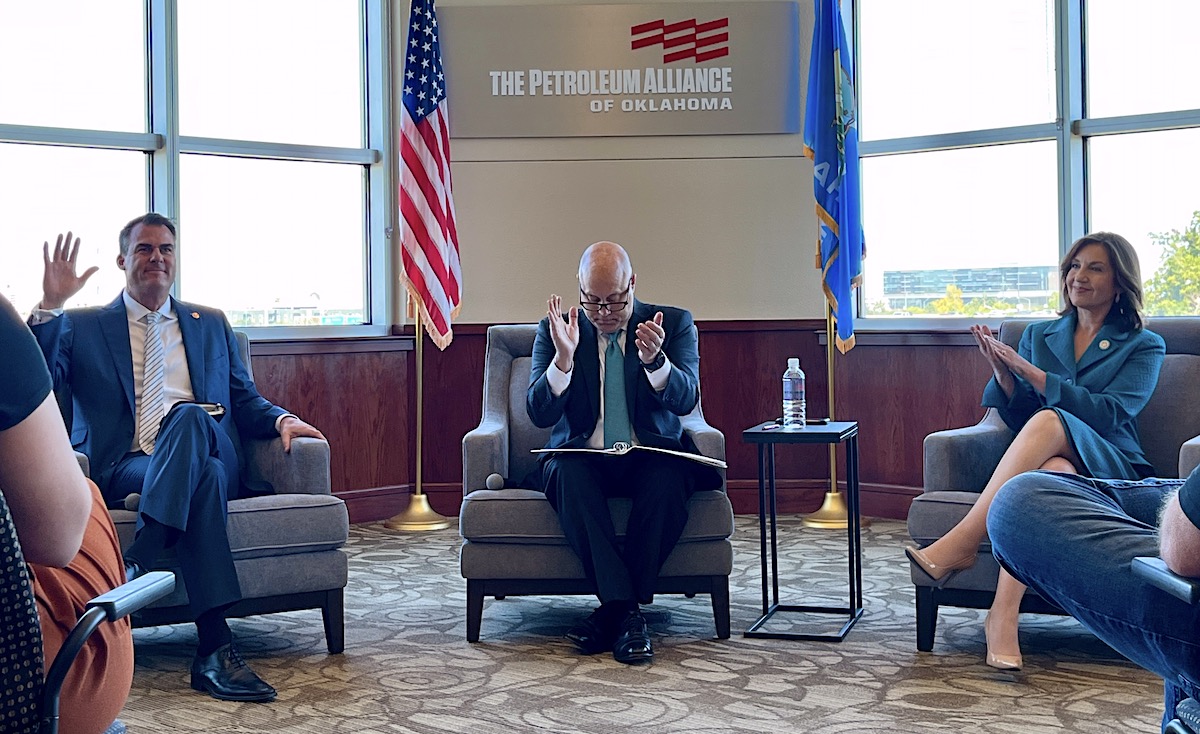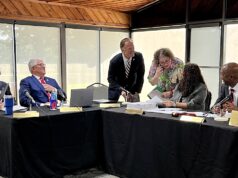

In what it calls a “precedential decision” that could apply to about 9,000 tribal citizen appeals, the Oklahoma Tax Commission ruled Oct. 4 against a Muscogee Nation citizen who had filed for an exempt tribal income exclusion. In its 19-page order released Wednesday, the state agency said tribal citizens who live and work for tribes in eastern Oklahoma do not qualify for the income tax exclusion outlined in state code if they do not live on land owned by their tribe or held in trust by the federal government.
As published, the anonymously written order redacts identifying information of the taxpayer who protested OTC’s original denial of the exempt tribal income exclusion, but it notes that they derive their income from the Muscogee Nation. The order emphasizes the nature of the taxpayer’s residence — a home they purchased from a bank — and claims “fee title” land does not meet the reservation definitions outlined in state code.
“The warranty deed provided by protestant demonstrates the land is not a formal reservation owned by the federal government. Protestant acquired fee title to the property in 2008, from a non-tribal grantor, the [Bank], as trustee for the [Trust],” the OTC order states. “Further, the deed does not indicate the land is held by the Muscogee (Creek) Nation or the federal government in trust for the Muscogee (Creek) Nation, nor is it subject to any restrictions, and therefore does not qualify as an informal reservation pursuant to Okla. Admin. Code § 710:50-15-2(a)(2).”
It is unclear whether the Oklahoma Tax Commission would grant the exempt tribal income exclusion to a Muscogee citizen who lived in public housing owned by the federal government or the tribe. (The petitioner in the case decided Oct. 4 plans to appeal to the Oklahoma Supreme Court, according to The Oklahoman.)
Nonetheless, the Tax Commission order bolsters Gov. Kevin Stitt’s argument that the historic 2020 U.S. Supreme Court decision in McGirt v. Oklahoma only affirmed the Muscogee Nation as a reservation for purposes of criminal jurisdiction, not civil jurisdiction.
“I am pleased to learn that today the Tax Commission released a decision reaffirming that every Oklahoma citizen is required to pay their fair share. This is a ruling in favor of certainty, fairness, and equality for all Oklahomans,” Stitt said. “We all drive on the same roads, send our kids to the same public schools and benefit from the same state services, so it is only right that every citizen of the state of Oklahoma, regardless of race or heritage, should contribute their fair share.”
But tribal leaders have said they believe their reservations — as affirmed in the McGirt decision — qualify their citizens who live and work within nation boundaries for the tribal exemption from state income tax.
Muscogee Nation Chief David Hill issued a statement casting doubt on the Tax Commission ruling.
“It is not surprising that a commission appointed by the governor ignored 50 years of established law and rendered a decision aligned with the governor’s misguided political campaign against tribal nations,” Hill said. “Tribal sovereignty benefits all Oklahomans. Tribal nations contribute billions to the state’s economy. These issues are a long way from being over and settled. We look forward to challenging any threat to our inherent sovereignty every step of the way.”
In June, the Muscogee National Council authorized the expenditure of up to $500,000 in support of filing a federal lawsuit “seeking relief on behalf of the Nation and Muscogee Citizens against unlawful state taxation within the boundaries of the Muscogee (Creek) Nation Reservation,” according to a report by Mvskoke Media. The suit has not yet been filed, but the Tax Commission’s new ruling could lead to the tribe’s authorized court challenge.
Cherokee Nation Principal Chief Chuck Hoskin Jr. has also voiced his belief that the tribal income tax exemption should apply to Cherokee citizens who live and work within their reservation boundaries.
“There’s nothing new about the law out there on the ability of a state to tax a member of a federally recognized tribe on a reservation. What’s new, of course, is the scope of the reservation (because) of the McGirt case,” Hoskin said during an October 2021 panel discussion hosted by the Oklahoma Policy Institute. “So, we can look to existing law, and we can see that taxation doesn’t attach to individual Native Americans who live on reservations.”
On Tuesday, after an event where Hoskin, Hill, Chickasaw Nation Gov. Bill Anoatubby and Seminole Nation Chief Lewis Johnson had joined him in endorsing Democrat Joy Hofmeister’s campaign to unseat Stitt, Choctaw Nation Chief Gary Batton said he also believes the tribal income tax exemption applies to his citizens who live and work within the Choctaw Nation Reservation boundaries.
“Yes, that’s our interpretation,” Batton said. “However, I want to make sure that people understand that it’s critical — we are Oklahomans. I keep saying, my kids went to a public school system, my wife is a non-Indian. We still have to figure out a way that we can support (the state). We do that currently. We give to all 85 school districts (in our boundaries). Currently, we have a summer program for Indians and non-Indians, that if they’re behind in the third grade to help them get elevated and get caught back up.”
Batton said he would be open to discussions about state-tribal compacts on income taxes if “the right governor” were leading Oklahoma.
“I’m going to stick up for our tribal members and believe in our sovereignty,” he said. “But also, at the same time, I understand that this impacts us as a whole.”
Issued discussed by gubernatorial candidates

Asked after the five tribal leaders’ endorsement press conference Tuesday whether she believes tribal citizens who live and work within the reservation boundaries in eastern Oklahoma are subject to the income taxation authority of the state, Hofmeister did not directly answer the question.
“So my position is that we need to have relationships to have the best outcomes,” Hofmeister said. “We have seen a fail over the last four years with that, and I am committed to working so that we have a win-win for all Oklahomans, and with Gov. Stitt, there is always a loser.”
Asked to clarify whether she believes the state of Oklahoma retains income taxation authority in these situations, Hofmeister spoke of negotiation.
“It is always best to come together to negotiate any issue,” Hofmeister said. “There are often differences with multiple partners, but it is always best when we can come together and negotiate, so that is what I’m committed to doing.”
The next day, during a forum hosted by the Petroleum Alliance of Oklahoma, Stitt and Hofmeister were asked about the reservations affirmed in eastern Oklahoma by the U.S. Supreme Court. Stitt, a Cherokee citizen, cited himself and his wealth as an example of the inequity he would consider inappropriate if the state loses income tax jurisdiction over citizens of the Five Tribes who live and work on their eastern Oklahoma reservations.
“We won the tax case. (There were) 9,000 tax protests saying they didn’t have to pay taxes in eastern Oklahoma,” Stitt said. “That means Kevin Stitt, before he was governor and was CEO of a bank, doesn’t have to pay taxes (…) but a single mom of a different race does? And our kids all go to Jenks High School and we all drive on the same roads? Preposterous.”
However, the state code outlining the complicated income tax exemption specifies that the tribal citizen’s income must be “earned from sources within ‘Indian Country’ under the jurisdiction of the tribe to which the member belongs” or be paid by a branch of the U.S. military. Stitt’s bank is not under the jurisdiction of the Cherokee Nation, but tribes do control many businesses operating in the state.
After the forum, Stitt called the Tax Commission ruling “a fairness deal” and “a huge relief.”
“I mean, you’re talking about hundreds and hundreds of millions of state dollars that would be affected for state revenue,” Stitt said. “Plus the fairness aspect of it. You can’t have one race not paying taxes and every other race paying taxes. That doesn’t make sense in Tulsa, Oklahoma.”
Stitt’s own press release regarding the Tax Commission decision estimated the fiscal impact of potential tribal income tax exemptions to be lower, at about $75 million a year. The release said that, between August 2020 and September of this year, 9,261 taxpayers claimed an exemption from state income taxation owing to the tribal income exclusion.
“Of those who disagreed with the Tax Commission’s handling of the claimed exemption, 642 filed protests,” the release stated.
SCOTUS denies cert on Oklahoma’s request to define ‘Indian’
The Tax Commission’s released ruling was not the only major development regarding state and tribal affairs this week. On Tuesday, the U.S. Supreme Court denied certiorari in Oklahoma v. Wadkins, a case where Eric Wadkins, a Choctaw Nation citizen, was convicted of kidnapping and raping a woman in 2017.
At the time the crime was committed, Wadkins was not an official member of the Choctaw Nation. The Oklahoma Court of Criminal Appeals ruled, however, that Wadkins proved his Native American genetic heritage through means other than official membership.
Wadkins had a Certificate of Degree of Indian Blood — a document issued by the federal Bureau of Indian Affairs that indicates a blood degree by tribe — for most of his life and used it to receive benefits from the tribe. Additionally, several of Wadkins’ family members were enrolled members of the Choctaw Nation.
The state appealed the OCCA’s ruling in the case to the U.S. Supreme Court, seeking a ruling that tribal membership was required at the time a crime is committed for the defendant to be deemed Native American in accordance with the Major Crimes Act and thus subject only to the jurisdiction of a tribe or the federal government.
By denying certiorari on the case, the nation’s highest court declined to hear arguments over the definition of an “Indian,” which could have led to even more fundamental changes to federal Indian law precedent.
Earlier this year, the Supreme Court ruled in Oklahoma’s favor in the Castro-Huerta case, granting states authority to prosecute non-tribal citizens who commit crimes against tribal citizens on reservations. The decision was celebrated by Stitt but criticized by tribal leaders and some legal scholars for upending decades worth of established precedent.
Read the full Tax Commission order here
(Update: This article was updated at 8:55 a.m. Friday, Oct. 14, to include additional information and clarify requirements for the exempt tribal income exclusion.)




















